#princess taiping
Note
How about Princess Taiping and Mi Yue (separately) dating reader, who is very sassy and kind at the same time?
First Fate of the Empress request!!!
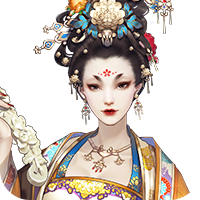
Princess Taiping
She is very interested in the courage you have to talk to a princess in that manner. She isn’t offended, but she is very amused. Behind closed doors, she would most definitely reciprocate the attitude you give.
Out in public, she reminds you that you must respect her because of her position in the imperial family. If you decide to make a smart remark back to someone, she will try to hold in her laughter and nudge you with her arm.
Chances are, you are one of her servants and a higher-ranking one so that you serve her directly (think the handmaidens in the Remarried Empress). That is when you both go off and judge everyone in the palace behind closed doors. She had to admit that it was her favorite way to pass the time
She does get a bit jealous whenever she sees you being kind to a new staff member. That should be reserved for her, don’t you think? However, since it was an order from the Emperor, she can’t do anything. She sits and contemplates how she could grab you away to only dote on her.
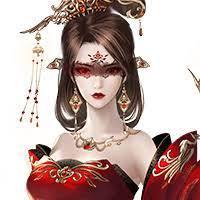
Mi Yue
She’s very smooth with her words, and I feel like she’s more flirtatious with her lover, especially behind closed doors. Your sass, in turn, becomes more flirty because of the influence she has on you.
Out in public, she’s always busy because she’s a doctor, but if she sees you in passing then she’ll make a quiet remark that only you could hear. Because she knows she has an image to keep, she will keep the flirting to a minimum.
If you had enough power and influence in the Imperial Palace, then she might be one of the people who see to it that your needs are met. Of course, her first priority will always be the Emperor, but we don’t need to talk about that.
She feels proud whenever she sees you leading someone through their tasks as a new member of the Palace staff. You're the kind to make anyone feel at ease with a few sarcastic remarks and a few jokes sprinkled into the conversation
#fate of the empress#fate of the empress x reader#princess taiping#princess taiping x reader#mi yue#mi yue x reader#FOTE
37 notes
·
View notes
Text
there's a lot of people running around in cloaks this season-
(donghua s2)
#white cat legend#general lang#catty lord li bing#yi zhi hua#white cat legend season 2#white cat legend donghua#princess taiping
1 note
·
View note
Text

Women warriors in Chinese history - Part 1
“In the nomadic tribes of the foreign princesses from the Steppes northwest to the northeast of the Chinese borders, women habitually rode horses and were frequently also skilled militarily. They had to be able to survive on their own and defend themselves when their men left camp to herd animals for months on end. Thus, unsurprisingly, many daughters of nomadic and semi-nomadic tribal chiefs were also capable fighters. Madam Pan 潘夫人 of “barbarian origins” during the Wei dynasty, the semi-barbarian Princess Pingyang 平陽公主 who helped establish the Tang dynasty, and the “barbarian queen,” Empress Dowager Xiao, are historical examples of this category of female generals.
While the barbarians to the north were known as fan 番, those belonging to peripheral areas from the southwest to the southeast were known as man 蠻. Like the nomadic princesses, these women of non-Chinese or Chinese ethnic minority groups did not bind their feet and could thus become formidable opponents. Indeed, the female battle units within the Taiping 太平 rebel forces that actually entered combat – rather than merely providing labour as most of the female units did –were reportedly made up in the main of women from the Miao 苗 tribes, aside from the Hakka (Kejia 客家) women of Guangxi.
Female bandit leaders or daughters and sisters of bandit leaders who occupied mountains or established strongholds in marginal lands are almost indistinguishable from the man barbarian princesses of tribal chieftains in novels and shadow plays. Such barbarian women generals and female bandit leaders were rarely privileged enough to be recorded by the historians. The three found most frequently, Madam Xi 洗夫人 (502– 557), Madam Washi 瓦氏夫人 (1498–1557),95 and Madam Xu 許夫人 (1271–1368), were all pro-Chinese. While the first two cooperated with the Chinese government, the third joined Chinese forces against the Mongols. A certain Zhejie 折節 or Shejie 蛇節, a female leader of the Miao tribe, also led a rebellion against Mongol troupes, but she eventually surrendered to them and was subsequently executed.
Real enemies of the Chinese empire, such as the Trv’vy sisters of Vietnam, are hardly ever mentioned by the Chinese, even though they are first recorded in the Han dynastic history. Even under such circumstances, of the women commanders in Chinese history studied by Xiaolin Li, a hefty per cent were from “minor nationalities.”
Female rebel leaders and women warriors in rebel forces tended to rise from peasantry and marginal groups such as families of itinerant performers, robbers, boatmen, and hunters. Many of them are beautiful and charismatic. Most of the rebel groups were basically bandits (known as haohan 好漢, “bravos” euphemistically) – how else could they have survived without a continuous source of income? Many of the bandit groups, like the sworn brothers of the Water Margin, lived in mountains and marshlands, awaiting a chance to start or join in an uprising with the hope of gaining power and legitimacy through either pardon (when they posed too great a threat to the state) or founding a new dynasty. Many had sisters, wives, or daughters who were also capable of leading armies.”
Chinese shadow theatre: history, popular religion, and women warriors, Fan Pen Li Chen
#history#women in history#warrior women#women's history#historyblr#warriors#quotes#women warriors#china#chinese history#asian history#Princess Pingyang#empress dowager chengtian#lady washi#taiping rebellion#trung sisters
149 notes
·
View notes
Text
[Hanfu · 漢服]The relationship between women in history is not just love rivals,
“but also thousands of years later, everyone knows that it is me and you.”
Let's get to know about them/她们 in China history.
1.【Han Dynasty】:Princess Jieyou (解忧公主) & Feng Liao (馮嫽)
Princess Jieyou (Chinese: 解忧公主; 121 BC – 49 BC), born Liu Jieyou (Chinese: 刘解忧), was a Chinese princess sent to marry the leader of the Wusun kingdom as part of the Western Han Chinese policy of heqin(和亲).
As the granddaughter of the disgraced Prince Liu Wu (劉戊) who had taken part in the disastrous Rebellion of the Seven States,her status was low enough that she was sent to replace Princess Liu Xijun (劉細君) after her untimely death and marry the Wusun king Cunzhou (岑陬).
Jieyou lived among the Wusun for fifty years and did much work to foster relations between the surrounding kingdoms and the Han. She was particularly reliant upon her attendant, Feng Liao, whom she dispatched as an emissary to Wusun kingdoms and even to the Han Court. She faced opposition from pro-Xiongnu members of the Wusun royalty, particularly Wengguimi’s Xiongnu wife. When word came that the Xiongnu planned to attack Wusun, she convinced her husband to send for aid from the Han Emperor. Emperor Wu of Han sent 150,000 cavalrymen to support the Wusun forces and drive back the Xiongnu.
In 51 BCE at the age of 70, Jieyou asked to be allowed to retire and return to the Han. Emperor Xuan of Han agreed and had her escorted back to Chang'an where she was welcomed with honor. She was given a grand palace with servants usually reserved for princesses of the imperial family. In 49 BCE, Jieyou died peacefully.
Feng Liao (馮嫽)
Feng Liao (馮嫽) was China's first official female diplomat,[citation needed] who represented the Han dynasty to Wusun (烏孫), which was in the Western Regions. It was a practice for the Imperial Court to foster alliances with the northern tribes via marriage, and two Han princesses had married Wusun kings.
Feng Liao was the maidservant of Princess Jieyou (解憂公主), who was married off to a Wusun king. Feng herself later married an influential Wusun general, whose good standing with Prince Wujiutu (烏就屠) of the kingdom later proved beneficial to the Han dynasty.
When Prince Wujiutu seized the throne of Wusun in 64 BC, after his father died, there was fear in the Imperial Court of Han that Wujiutu, whose mother was Xiongnu, would allow Wusun to become Xiongnu's vassal.
Zheng Ji, Governor of the Western Regions, recalled that Feng Liao had married into Wusun and with her familiarity of the Wusun customs, she was a prime candidate to persuade Wujiutu to ally his kingdom with Han. Wujiutu acceded and Emperor Xuan of Han (漢宣帝) sent for Feng. He praised her for her judgement and diplomacy, and appointed her as the official envoy to Wusun.
Wujiutu was conferred the title "Little King of Wusun" while his brother, the son by a Han princess, was named "Great King of Wusun". Wusun was divided between the two kings and tensions in that region were eased.
※Xiongnu: Xiongnu: A nomadic tribe that has occupied northern China for a long time. Later it gradually became a state. It harassed the borders of the Han Dynasty for a long time and robbed supplies.
------
With their efforts, the Wusun Kingdom gradually tended to support the Han Dynasty, and the Xiongnu's defeat in China also began.
------
2.【Tang Dynasty】:Shangguan Wan'er(上官婉儿)&Princess Taiping (太平公主)
Shangguan Wan'er/上官婉儿 (664 – 21 July 710) was a Chinese politician, poet, and imperial consort of the Wu Zhou and Tang dynasties. Described as a "female prime minister,"Shangguan rose from modest origins as a palace servant to become secretary and leading advisor to Empress Wu Zetian of Zhou. Under Empress Wu, Shangguan exercised responsibility for drafting imperial edicts and earned approbation for her writing style. She retained her influence as consort to Wu's son and successor, Emperor Zhongzong of Tang, holding the imperial consort rank of Zhaorong (昭容). Shangguan was also highly esteemed for her talent as a poet.Shangguan was also highly esteemed for her talent as a poet. In 710, after Emperor Zhongzong's death, Shangguan was killed during a palace coup that ended the regency of Empress Dowager Wei.
Princess Taiping (太平公主)lit. "Princess of Great Peace", personal name unknown, possibly Li Lingyue (李令月) (after 662 – 2 August 713) was a royal princess and prominent political figure of the Tang dynasty and her mother Wu Zetian's Zhou dynasty. She was the youngest daughter of Wu Zetian and Emperor Gaozong and was influential during the reigns of her mother and her elder brothers Emperor Zhongzong and Emperor Ruizong (both of whom reigned twice), particularly during Emperor Ruizong's second reign, when for three years until her death, she was the real power behind the throne.
She is the most famous and influential princess of the Tang dynasty and possibly in the whole history of China thanks to her power, ability and ambition. She was involved in political difficulties and developments during the reigns of her mother and brothers. Indeed, after the coup against Empress Dowager Wei, she became the real ruler of Tang. During the reign of Emperor Ruizong, she was not restricted by anything, the emperor issued rulings based on her views and the courtiers and the military flattered her and majority from every civil and military class joined her faction, so her power exceeded that of the emperor.
Eventually, however, a rivalry developed between her and her nephew, Emperor Ruizong's son, Crown Prince Li Longji. Both of them were hostile in power-sharing and they fought for the monopoly over power. After Emperor Ruizong yielded the throne to Li Longji (as Emperor Xuanzong) in 712, the conflict came to the political forefront, and openly, the court became a manifestation of conspiracy rather than the administration of the empire; in 713, Emperor Xuanzong, according to historical records, believing that she was planning to overthrow him, acted first, executing a large number of her powerful allies and forcing her to commit suicide.
------
The relationship between Shangguan Wan'er and Princess Taiping has always been written as "enemies" in official history, but with the phrase "千年万岁,椒花颂声", their friendship that has been buried for thousands of years was revealed.
The"千年万岁,椒花颂声" sentence comes from the epitaph written by Princess Taiping for Shangguan Wan'er. The original text is: "潇湘水断,宛委山倾,珠沉圆折,玉碎连城。甫瞻松槚,静听坟茔,千年万岁,椒花颂声”
Translation: Now that you are far away, the sky and the earth will lose their color. I'm afraid that all I can do in the future is to sit and look at the tea tree in front of your tomb. Maybe I can hear your voice again when I stand within an inch of the tomb. But this is a delusion after all, a quiet tomb, no beautiful face, a empty place of death. I hope that in a thousand or ten thousand years, there will still be people like me who remember you.
------
3.【Late Qing Dynasty】:Lü Bicheng(呂碧城) & Qiu Jin (秋瑾)
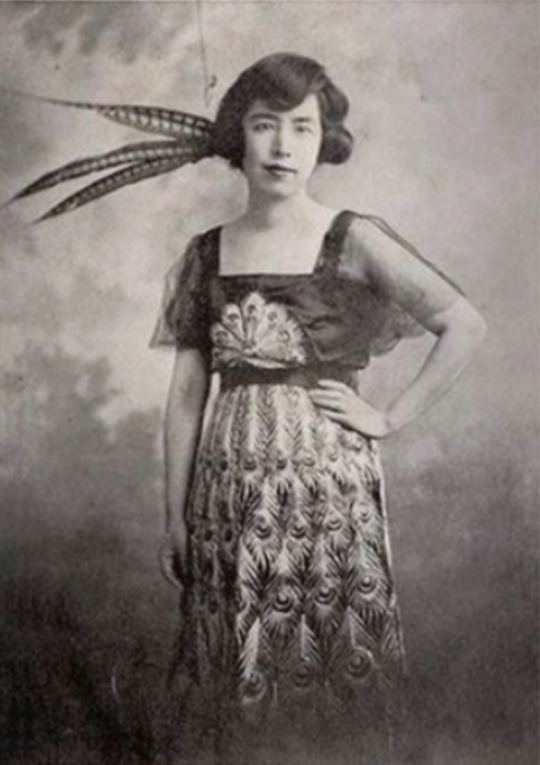
Lü Bicheng(呂碧城)also known as Alice Pichen Lee(1883–1943) was a Chinese writer, activist, newspaper editor, poet and school founder. She has been mentioned as one of the top four women in literature from the early Republic of China.
When she was four, her father retired to Lu'an, Anhui. She lived a life of comfort until the age of 12, when her father died in 1895. Because Lü Fengqi had no male heir, relatives of the Lü lineage contested for his inheritance, and Yan Shiyu and her four daughters were forced to move to Lai'an County to live with her natal family. When she was nine, Lü Bicheng was betrothed to a Wang family, but as her own family fortune declined, the Wang family broke off the marriage contract, giving the young Bicheng the stigma of a "rejected woman". The resulting emotional scar is often considered a major factor in her later decision to never marry.[8] Her widowed mother and the Lü girls were not well treated at the Yan family in rural Anhui. When Lü was 15 or 16, Yan Shiyu sent her to live with her maternal uncle Yan Langxuan (嚴朗軒), who was the salt administrator in Tanggu, the port city outside the northern metropolis of Tianjin. Her sister Huiru also joined her later.
During her stay in Tanggu, Qing China went through the tumultuous period of the failed Hundred Days' Reform of 1898, which brought about increasing awareness of women's education, and the Boxer Rebellion of 1900. In 1904, Mrs. Fang, the wife of her uncle's secretary, invited Lü Bicheng to visit a girls' school in Tianjin, but her uncle prevented her from going and severely reprimanded her. The next day, she ran away from her uncle's home, and took the train to Tianjin with no money or luggage. She wrote a letter to Mrs. Fang, who was staying at the dormitory of the Ta Kung Pao newspaper. Ying Lianzhi, the Catholic Manchu nobleman who founded the newspaper, read the letter and was so impressed by it that he made her an assistant editor. Lü Bicheng wrote a "progressive" ci that she had previously written, set to "A River Full of Red" ("Manjianghong") usually used to express heroic emotions. Ying transcribed the whole song in her diary and published it in L'impartial two days later. At the time, it was sensational for a woman to write for an influential national newspaper such as Ta Kung Pao. She was 21 years old. She used Ta Kung Pao to promote feminism and became a well-known figure.
Lü's ci poetry was published in the newspaper and it was very well received. She was the chief editor of the newspaper from 1904 to 1908. In 1904 she decided to improve education for girls. She had published her thoughts on women's rights and the general editor of the newspaper introduced her to Yan Fu who was an advocate for Western ideas. The Beiyang Women's Normal School was established that same year. At 23 Lü took on the job of principal of the school she had founded two years before. At first this school found it difficult to find girls who qualified for secondary education and students were brought in from Shanghai to make up the numbers.
Lü knew the revolutionary Qiu Jin and they had similar objectives but Lü did not join her in Japan when she was invited as she was unsure whether women should meddle in politics. She was then chosen to be secretary to Yuan Shikai, one of the most powerful people in China. When he set out to declare himself emperor of China she left, like many of his followers, and abandoned him.
--

Qiu Jin (秋瑾)8 November 1875 – 15 July 1907,was a Chinese revolutionary, feminist, and writer.Her sobriquet name is Jianhu Nüxia (Chinese: 鑑湖女俠 lit. 'Woman Knight of Mirror Lake').
Qiu was born into a wealthy family. Her grandfather worked in the Xiamen city government and was responsible for the city's defense. Zhejiang province was famous for female education, and Qiu Jin had support from her family when she was young to pursue her educational interests. Her father, Qiu Shounan, was a government official and her mother came from a distinguished literati-official family. Qiu Jin's wealthy and educated background, along with her early exposure to political ideologies were key factors in her transformation to becoming a female pioneer for the woman's liberation movement and the republican revolution in China.
In the early 1900s, Japan had started to experience western influences earlier than China. As to not fall behind, the Qing government sent many elites to learn from the Japanese. Qiu Jin was one of these elites that got the chance to study overseas. After studying in a women's school in Japan, Qiu returned to China to participate in a variety of revolutionary activities; and through her involvement with these activities, it became clear how Qiu wanted others to perceive her. Qiu called herself 'Female Knight-Errant of Jian Lake' — the role of the knight-errant, established in the Han dynasty, was a prototypically male figure known for swordsmanship, bravery, faithfulness, and self-sacrifice — and 'Vying for Heroism'
Qiu Jin had her feet bound and began writing poetry at an early age. With the support from her family, Qiu Jin also learned how to ride a horse, use a sword, and drink wine—activities that usually only men were permitted to learn at the time.In 1896 Qiu Jin got married. At the time she was only 21, which was considered late for a woman of that time. Qiu Jin's father arranged her marriage to Wang Tingchun, the youngest son of a wealthy merchant in Hunan province. Qiu Jin did not get along well with her husband, as her husband only cared about enjoying himself.While in an unhappy marriage, Qiu came into contact with new ideas. The failure of her marriage affected her decisions later on, including choosing to study in Japan.
While still in Tokyo, Qiu single-handedly edited a journal, Vernacular Journal (Baihua Bao). A number of issues were published using vernacular Chinese as a medium of revolutionary propaganda. In one issue, Qiu wrote A Respectful Proclamation to China's 200 Million Women Comrades, a manifesto within which she lamented the problems caused by bound feet and oppressive marriages. Having suffered from both ordeals herself, Qiu explained her experience in the manifesto and received an overwhelmingly sympathetic response from her readers. Also outlined in the manifesto was Qiu's belief that a better future for women lay under a Western-type government instead of the Qing government that was in power at the time. She joined forces with her cousin Xu Xilin and together they worked to unite many secret revolutionary societies to work together for the overthrow of the Qing dynasty.
Between 1905 and 1907, Qiu Jin was also writing a novel called Stones of the Jingwei Bird in traditional ballad form, a type of literature often composed by women for women audiences. The novel describes the relationship between five wealthy women who decide to flee their families and the arranged marriages awaiting them in order to study and join revolutionary activities in Tokyo. Titles for the later uncompleted chapters suggest that the women will go on to talk about “education, manufacturing, military activities, speechmaking, and direct political action, eventually overthrowing the Qing dynasty and establishing a republic” — all of which were subject matters that Qiu either participated in or advocated for.
Life after returning to China
Qiu Jin was known as an eloquent orator who spoke out for women's rights, such as the freedom to marry, freedom of education, and abolishment of the practice of foot binding. In 1906 she founded China Women's News (Zhongguo nü bao), a radical women's journal with another female poet, Xu Zihua in Shanghai. They published only two issues before it was closed by the authorities. In 1907, she became head of the Datong school in Shaoxing, ostensibly a school for sport teachers, but really intended for the military training of revolutionaries[citation needed]. While teaching in Datong school, she kept secret connection with local underground organization—The Restoration Society. This organization aimed to overthrow the Manchu government and restore Chinese rule.
Death
In 1907, Xu Xilin, Qiu’s friend and the Datong school’s co-founder was executed for attempting to assassinate his Manchu superior. In the same year, the authorities arrested Qiu at the school for girls where she was the principal. She was tortured but refused to admit her involvement in the plot. Instead the authorities used her own writings as incrimination against her and, a few days later, she was publicly beheaded in her home village, Shanyin, at the age of 31. Her last written words, her death poem, uses the literal meaning of her name, Autumn Gem, to lament of the failed revolution that she would never see take place:
秋風秋雨愁煞人
(Autumn wind, autumn rain — they make one die of sorrow)
After Qiu Jin was killed, no one dared to collect her body. Lu Bicheng endured her grief and took great risks to bury her friend. The guarding Qing army learned that the woman who came to collect the corpse was Lu Bicheng, who was famous in China, and they had no choice but to do anything.
Qiu Jin's death caused Lu Bicheng to lose a rare confidant in life. She wrote many poems in memory of Qiu Jin, recalling this like-minded friend.
Later, Lü Bicheng wrote "The Biography of the Revolutionary Heroine Qiu Jin" in English, which was published in newspapers in New York, Chicago and other places in the United States. It caused a great response and not only made many people in the world know about Qiu Jin's legendary story, but also published it in newspapers in New York and Chicago. It also makes people understand the darkness and corrupt social status quo of the Qing Dynasty. Lu Bicheng used a pen of her own to record her friendship with Qiu Jin, and also fulfilled her promise to Qiu Jin to respond with the "battle of words"
————————
📸Video & 🧚🏻 Model:@荷里寒 & @阿时Ashi_
🔗Weibo:https://weibo.com/3618951560/NEZZnpQRq
————————
#chinese hanfu#china history#woman power#woman in history#hanfu#hanfu accessories#hanfu_challenge#chinese traditional clothing#china#chinese#han dynasty#tang dynasty#late qing dynasty#feminism#revolution#漢服#汉服#中華風#girl power#hanfu girl
357 notes
·
View notes
Text
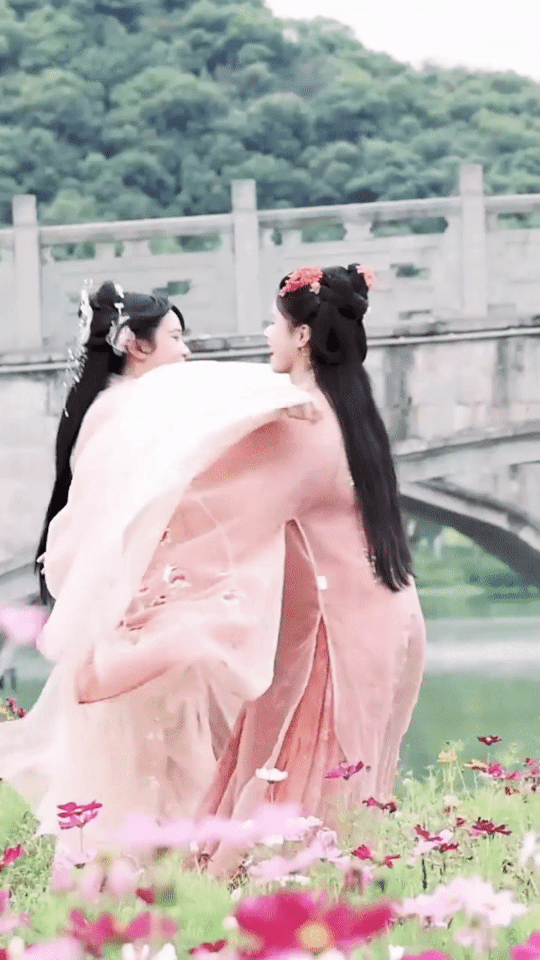
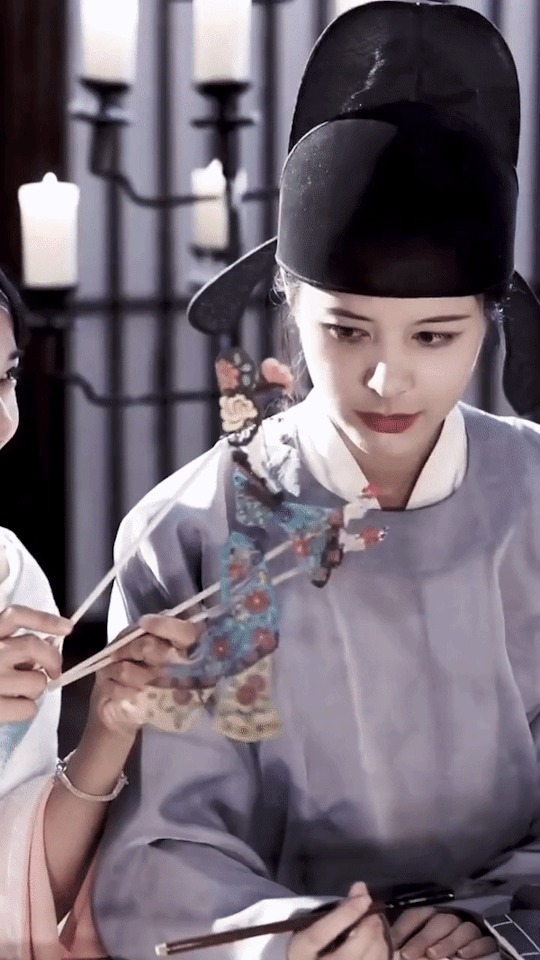
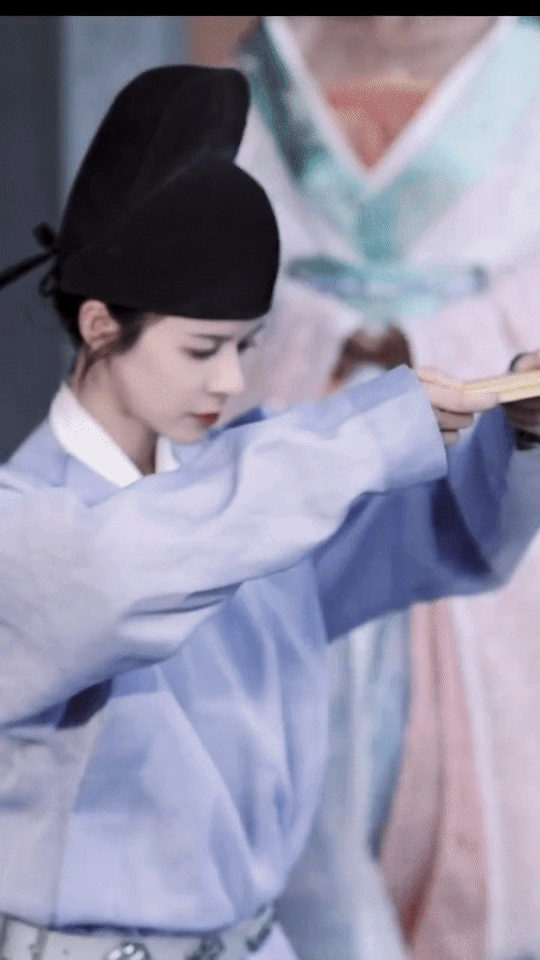

Sneak peek of a (hopefully upcoming) short film featuring Sheng Wei and Yang Fuyu, based on the story of Princess Taiping and Shangguan Wan'er aka chinese history's most famous f/f couple
105 notes
·
View notes
Photo
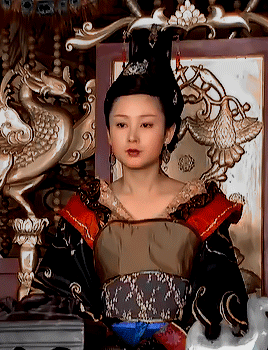
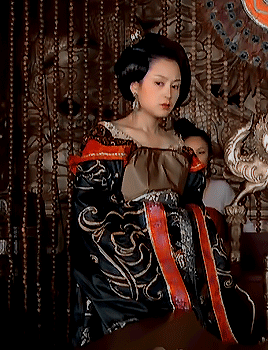
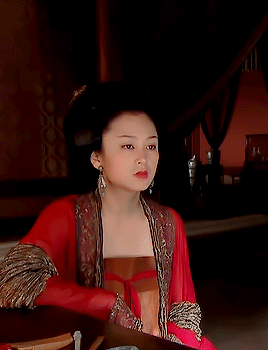


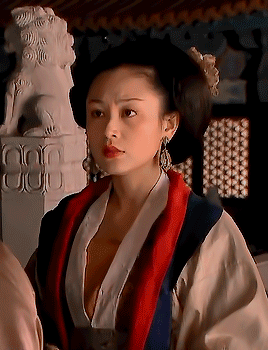


Chen Hong as Princess Taiping | 大明宫词 (2000)
#大明宫词#palace of desire#cdramaedit#asiandramasource#asiandramanet#userdramas#olddramas#chineseartistsinc#gifshistorical#perioddramasource#dailyasiandramas#periodedits#tw: fire#tw: flickering#*mine#i said i wasn't gonna gif this show again but clearly im a clown#sorry for the trashy quality of these lol
90 notes
·
View notes
Text
Chapter 108 (Taiping temple)


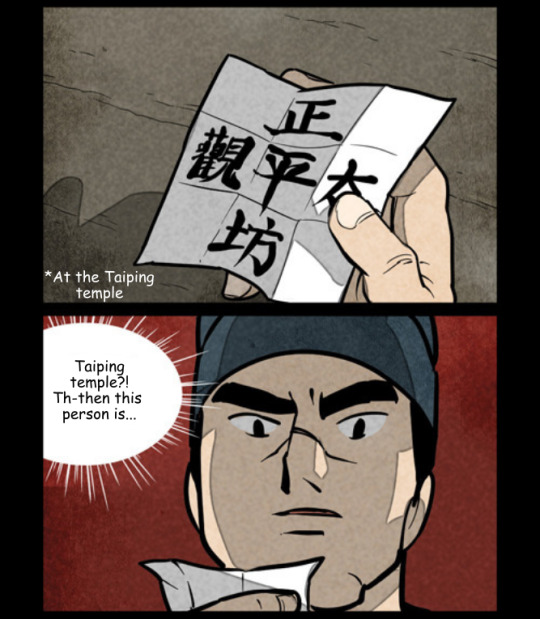


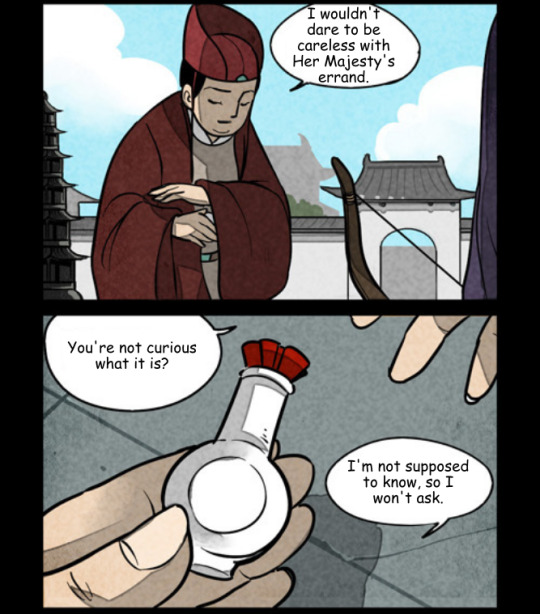
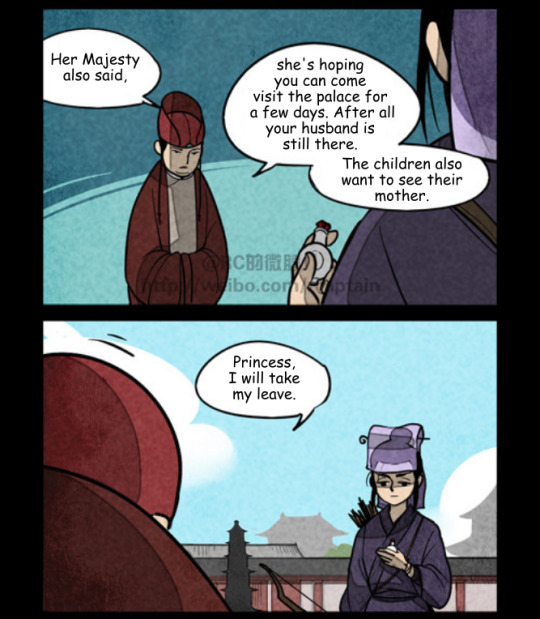
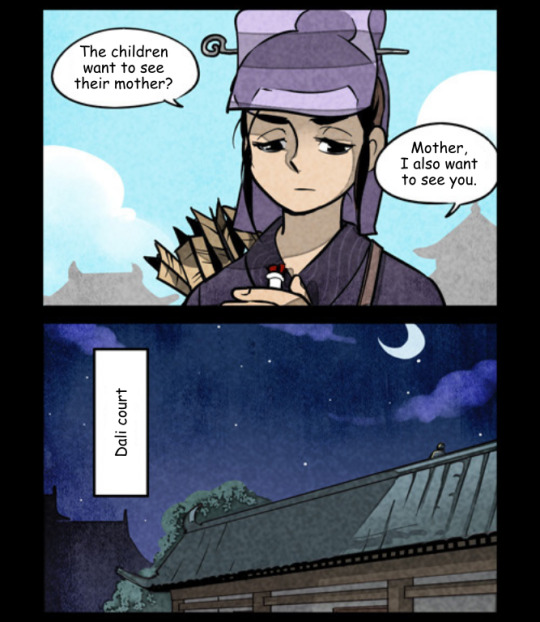

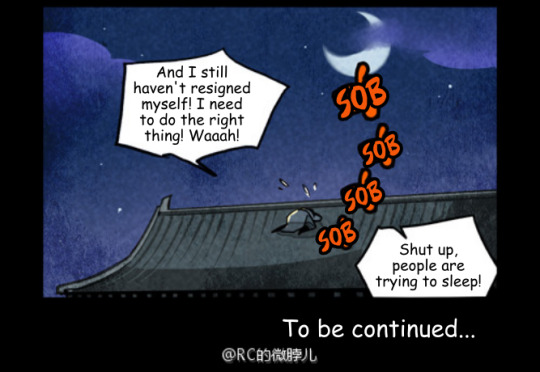
<< First <Previous || Chapter 108 || Next >>
Master post
"I wish you two happiness" - the original doesn't specify two, but it does use plural you. I felt like keeping it to just "you" would kind of muddle the context for the "cheater" comment.
"I'm so tired" - a word specifically for mental exhaustion is used. I don't think English has an equivalent?
It’s unclear when exactly Taiping was born, but she should be in, like… her late twenties during the events of the manhua? She became a Taoist nun in 670, and at some point when the king of Tufan requested marriage to her during peace negotiations, her father refused and had the Taiping temple built, making Taiping its abbess. Princess Taiping was married, twice. Her first husband (with whom she had two sons and a daughter) was executed for colluding with Li Chong along with his brothers – they were beheaded, he was starved to death (agonizing, but more honorable). A short while before officially seizing the throne, Empress Wu had her remarry (by assassinating the guy’s previous wife). So that’s the husband that’s being talked about here, Wu Youji.
(If you’re wondering about the surname – yes, the Wu in Wu Youji’s name is the same as in Wu Zetian’s. Wu Youji was the grandson of Empress Wu’s uncle. Taiping’s first husband was also related to Taiping, being her cousin on her father’s side. I’m not sure why I’m telling you this.)
20 notes
·
View notes
Text
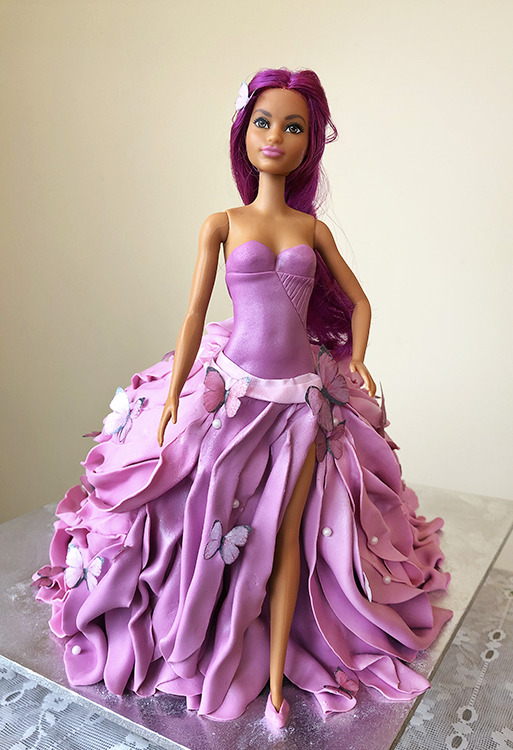


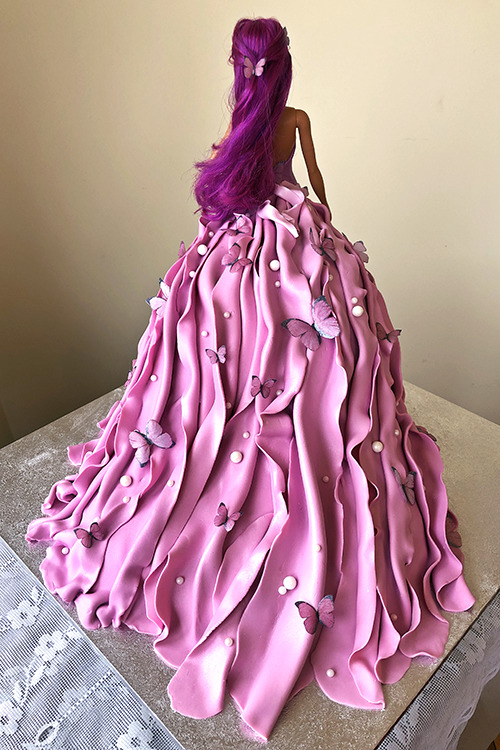
Butterfly Princess Barbie cake
by Siân Rumble Rumble Bespoke Cakes (Wellington, Aotearoa NZ)
Inspired by William Tan, Ipoh Bakery (Taiping, Malaysia)
5 notes
·
View notes
Note
Where does Wu Zetian fall in terms of emperors who shaped China? Was she as important as emperors like Li Shimin, Ying Zheng, Kublai etc.?
Wu Zetian made positive reforms to Tang. She reformed the Sui imperial examination system to make it less prejudiced and she also became an example to many women like her daughter in law Empress Wei and daughter Princess Taiping, however that era was short lived.
She managed to extend the Tang era of prosperity so it could reach its peak in Emperor Xuanzong's (and then it crashed and burned) but I'd say she was more someone who kept things going than a larger than life empire builder. Many foreign nations emulated Tang during her reign like Japan or Silla.
She arguably had more influence after her death as many women were inspired by her and later male emperors used her as a cautionary tale against giving their wives too much power.
She was definitely influencial and a good administrator and reformer with an eye for talent. But I don't think she was as important as the empire-building emperors like Ying Zheng or Li Shimin.
2 notes
·
View notes
Text

Jade Waist Slave
This fig is inspired by Zhang Zhehan's performance in Season 1 of the variety show, Everyone Stand By. He plays Xue Shao, the first husband of Princess Taiping, in a dramatic re-enactment of a famous scene from the Chinese TV show Palace of Desire.
Zhehan's one-take performance along with his acting co-partner Guo Yue is gorgeous - you can watch it here on YouTube. Unfortunately, it does not have English subtitles, but frankly I think it's even better if you watch the original scene first. Episode 13 of Palace of Desire is English subbed on YouTube here - I've set the link to start at the beginning of the scene (36:49). The scene ends at 43:13, when it cuts to the horse carriage. If you go back and watch Zhehan's performance, it'll be clear what's going on, and you'll be able to appreciate the beauty and expressiveness of his acting. In fact, it's so good it reminds me of the advice he gave to an actress on the ChaoA variety show, where he said, "Most of the time when you are acting, especially for costume drama, you have to be beautiful. It’s very critical. Even when you are crying, you have to be beautiful."
Case in point.

My best guess on the fig maker's name for this fig is that it's a poetic reference to the green costuming and Zhehan's line in the scene where he says: 逃离那个囚禁了我五年的牢笼
MTL translates this as: I'm escaping the cage that held me for five years [of marriage].
This could also be a total hack guess on my part and mean something very different. If anyone knows, please tell me!

Here he is, looking serious. And no wonder - he's grasping the live edge of a sword in his hand, causing it to bleed.

His loop of hair is distinctive for this character's costuming on the show. The historic figures of Xue Shao and Princess Taiping were married in 681, so this drama was set in very ancient times.
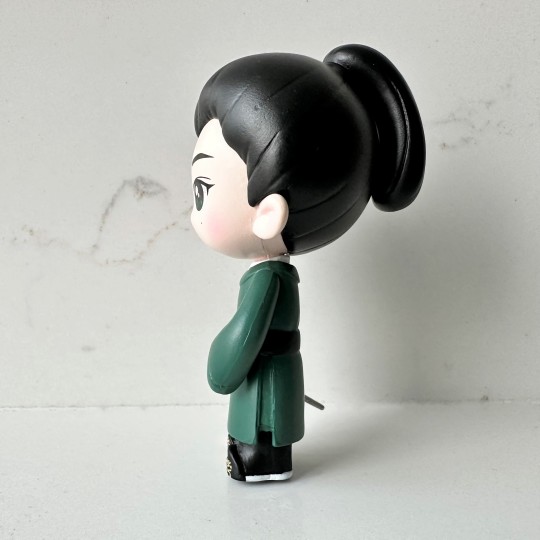
Another good view of the styling here. I like the gold design on the shoes.
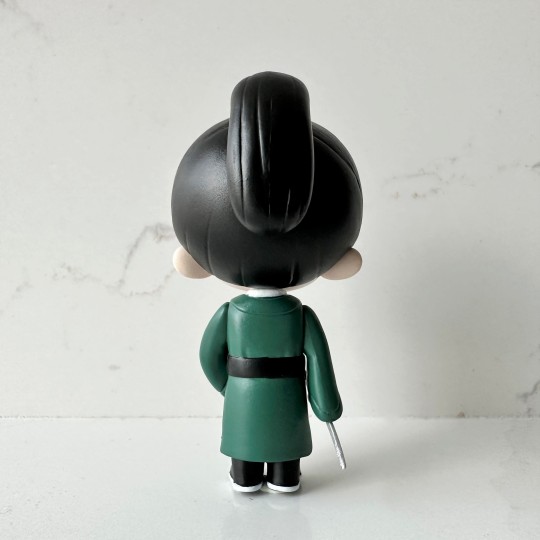
Again, a fairly plain costume all around, but in line with the costume in Palace of Desire.

An extreme closeup so you can see the fancy shoes and the very dramatic bloody hand.
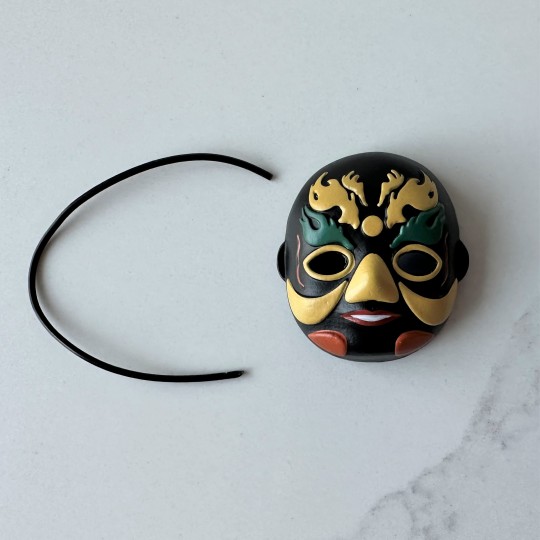
The fig was sold with an optional mask. The mask itself is quite beautiful and very well made. I fiddled around with the waxed tie for a while, before I decided to just go ahead and use putty to gently stick it to his head (it's removable). I'll give the band another go.
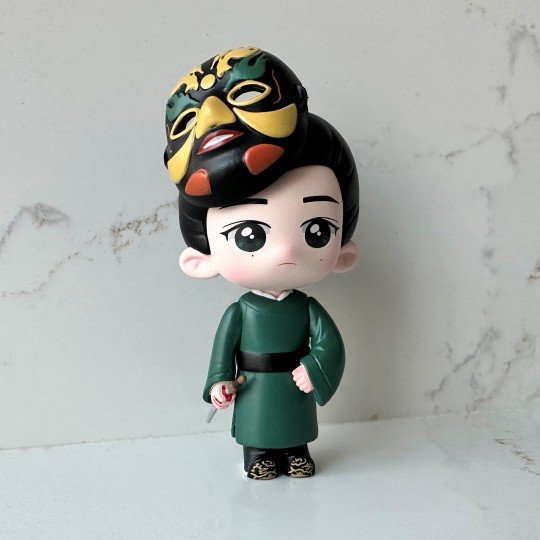
He doesn't balance all that well, so he'll be going on an acrylic base this weekend. I like the mask on him - he's not wearing it for this scene, so I might not display him with it, but it's bright and colorful on him.
[Fyi, Zhehan wears this mask in an entirely different scene where he plays a different version of Xue Shao in a different costume, and yes, there's a fig of that (from a different fig maker), and yes I will be posting about it! Stay tuned, amazing figthusiasts!]
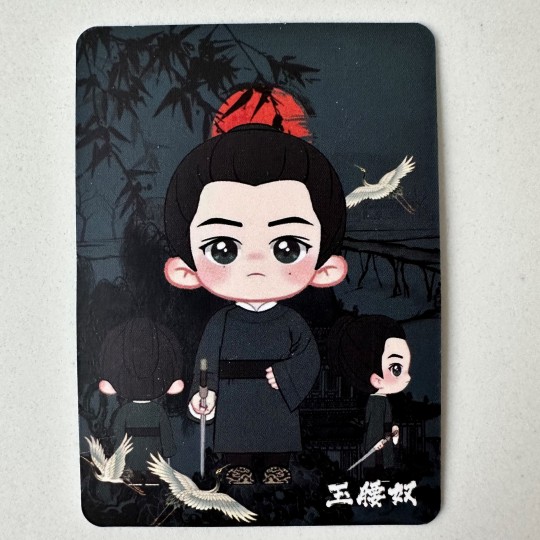

The dark and moody (and quite beautiful) box cards.
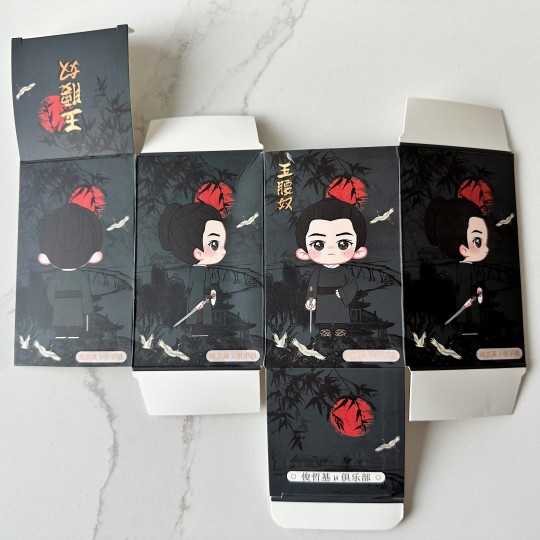
The box with the same art. So pretty.
Material: PVC
Fig Count: 143
Diorama Count: 9
Snowglobe Count: 1
Rating: Clean as ice and pure as jade
[link back to Master Fig Index for more posts]
3 notes
·
View notes
Text
The Role of Women in Chinese Taoism by Isabela Tablan
CHIN 206 Blog #3
Word Count: 516
The role of women in religions varies based on culture, country, and history. In some religions, women are viewed as objects of the male-centered gaze and are prevented from expressing their own opinions or worldviews. In contrast, in other religions, women are highly regarded and viewed as higher beings because of their ability to create life. In Taoism in China, women and female deities remained in the forefront of religious practices, which has differed greatly to the traditional patriarchy over women in ancient and imperial China.
Taoism began in the late Han Dynasty and is considered a “gender-neutral” religion, emphasizing the duality and importance of both masculine and feminine. Compared to other Chinese religions, such as Confucianism, Taoism allowed more women to be prominent in divinity, traditions, and practices.
Beginning with Taoist deities, Xiwang Mu, the Queen Mother of the West, was one of the most prominent female Taoist deities. Manifesting in the early stages of Taoism, Xiwang Mu was associated with shamanistic traditions in Taoism and was often depicted with a three-legged crow and her peaches of immortality orchard. These symbols depicted with Xiwang Mu identified her as an immortal, in which eating peaches symbolized immortality and longevity, and the three-legged crow was a mythological creature in East Asian mythology. Beginning in the 3rd century BCE, Xiwang Mu began being depicted as human, but would have the tail of a leopard, the fangs of a tigress, and would wear a victory crown on her tangled hair. Xiwang Mu was worshipped throughout the Six Dynasties (Han-ruled Chinese dynasties), and was believed to be the protectress of women, and was revered as the female ideal. Xiwang Mu was a symbol of strength, independence, and femininity for Chinese women, contrasting the patriarchal ideal of a submissive woman.

Ancient art of Xiwang Mu, depicted with three-legged crow
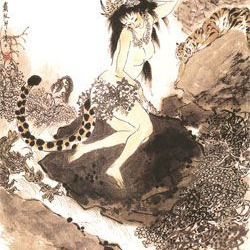
Art of Xiwang Mu, depicted with the tail of a leopard and victory crown
Stemming from the prominence of Xiwang Mu, women began to become significant in organized Taoism practices, establishing schools of Taoism and holding prominent positions. For example, during the Tang dynasty, women in Taoism reached their prominence, forming one-third of the Taoist clergy. According to official statistics, there were roughly 1,687 Taoist temples during the Tang Dynasty, where 1,137 men and 550 women served in religious positions. Women were in significant religious positions, such as initiators, preceptors, and possessors of sacred texts and methods. Many of these women would enter the Taoist faith looking for an escape from the patriarchal ideal of other Chinese religions. Many historians have found that women would convert to Taoism to escape unwanted marriage or were widows seeking a better life. One prominent case is that of Princess Taiping, the youngest daughter of Emperor Gaozong, who entered a Taoist convent in order to escape a marriage of state to a barbarian king of Turpan. The role of women Taoism allowed women to be somewhat liberated for the times and establish positions for themselves outside of the patriarchal ideals of Chinese society.
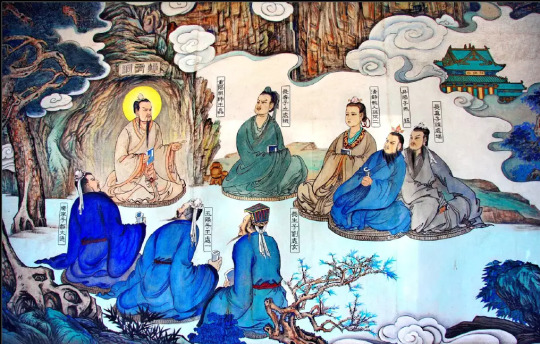
Female Taoist master sitting among male counterparts
As we learn about the many religion in East Asia, it is fascinating to see that women played a significant role in Taoism, as it contrasts the many other Chinese religions and mainstream Chinese society.
Sources:
3 notes
·
View notes
Note
supposedly don’t know who engagekiss but use “heavenly kingdom” ok lmao
also “ heavenly “ and “ kingdom “ are literally WORDS that existed before cher, I don’t even know who cherish is, my name is Dauphine as in “ princess “ , kingdom is natural for me to use
it depresses me how obsessed with her you all are , you see her in everyone
0 notes
Text
why do homework when u can randomly post a list of your nicknames for white cat legend characters-
in order of favoritism ✨
Yi Zhihua -"GE" "Green Eyes" (before i knew his name i just called him green eyes-)
Cui Bei - "Stormy" (it sounded cute to me but actually it contradicts his personality)
Alibaba - "Le Spin" "Spin" "Ali" (spinny boi :P)
Vice Minister Li Bing - "Catty Lord" "Vice Minister" "Kitty (in honor of ge)"
General Lang Bailing -"Lang" "General Lang"
Princess Taiping - "Princess"
Wang Qi - "Wang"
Sun Bao - "Bao"
Minister Lu Na - "Captain" "Olu (Old Lu)"
General Qiu Shenji - "Purple Hair"
Empress Wu Mingkong - "Empress"
Lai Junchen - "Snake" "Fox" "B****" (i kinda hate him, sorry)
#white cat legend#white cat legend donghua#white cat legend manhua#white cat legend characters#white cat legend character nicknames#and for minister xu i just call him minister xu or xu#i think im a certified white cat legend addict#also i just call chen shi chen shi totally didnt forget him or anyting somehow
3 notes
·
View notes
Note
Beside Wu Zetian and Yang Guifei. I want to see Princess Taiping (Wu Zetian's daughter), Wei Xiang'er (Wu Zetian's daughter in law), Princess Anle (Wei Xiang'er's daughter and Wu Zetian's niece) and Shangguan Wan'er (one of the Four Talented Women of China) as Servants
Ah here's the other ask that mentioned Wu's family I swear i'm tryin to catch up once again any content that would treat Wu seriously and tap into the themes her interlude introduced is more than welcome. I think Taiping and Shangguan from what I've read glimpsed also work well as their own individuals rather than just there by association. Would certainly be nice if Shangguan could be a low rarity quick support assassin, like a more accessible and support oriented version of Wu.
0 notes
Photo

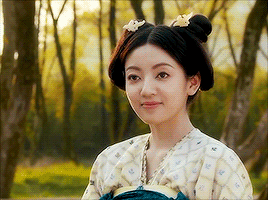



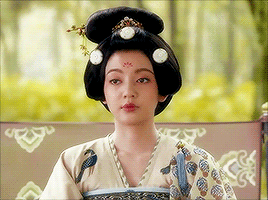
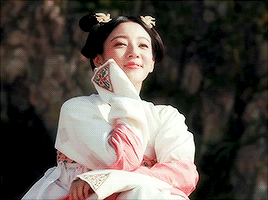

Princess Taiping (Taiping gongzhu), after 662��� 713 (Tang dynasty), was the youngest of the three daughters of Emperor Gaozong (r. 649– 683) and the only daughter (and youngest child) of Empress Wu. Her family name was Li, but her personal name and the year of her birth are not known. She was one of the most politically active Tang princesses and exerted a great deal of personal influence over the Tang court.
According to the New History of the Tang Dynasty (Xin Tang shu), on the death of her maternal grandmother, Lady of Rong State, she was sent at the age of about six (in 670) to a Daoist temple (Taiping guan) established for her to offer prayers for her grandmother and also to receive blessings for herself. When, however, in 677 a powerful Tufan (or Tubo, an old name for a Tibetan) neighbor asked for the then thirteen-year-old princess as a bride for the tribal leader, Empress Wu found a legitimate excuse for refusing this match by ordering that the princess be installed as head of the Taiping guan. While it has long been accepted that Princess Taiping underwent ordination at a young age, Charles Benn claims that her ordination was “spurious. It is highly improbable that she was ever seriously inducted into the priesthood, actually performed any sort of liturgical or administrative duties in the abbey, or even left the palace.” Benn states that the princess was a nun in name only, a pretense that was finally dropped when she married for the first time.
Source: Lee, Lily Xiao Hong; Wiles, Sue. Biographical Dictionary of Chinese Women, Volume II (University of Hong Kong Libraries Publications)
#historyedit#women in history#chinese history#princess taiping#太平公主#tang dynasty#cdrama#perioddramaedit#*mine#I made two gifs from that scene with her and fu rou lol#just imagine this is taiping and shangguan wan-er#fyi taiping and wan'er had a really close relationship#her name might be lingyue but it's not certain
319 notes
·
View notes
Photo
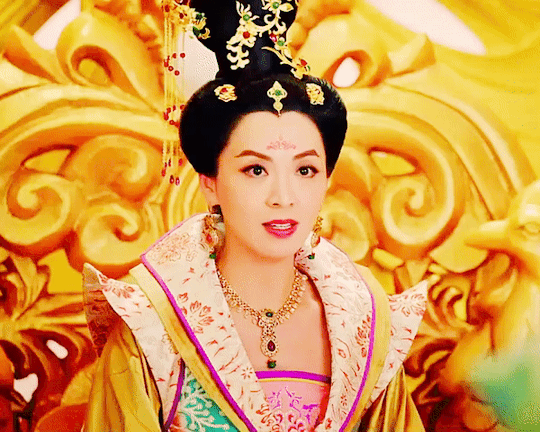

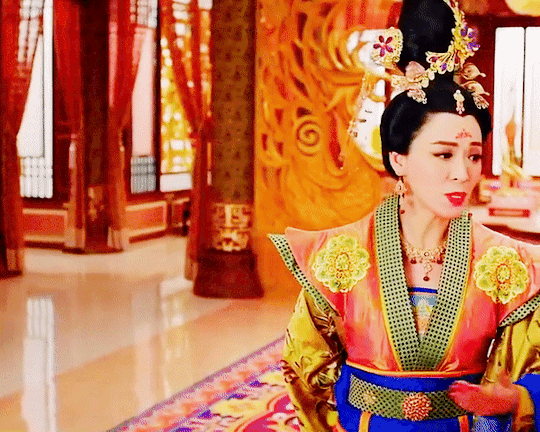
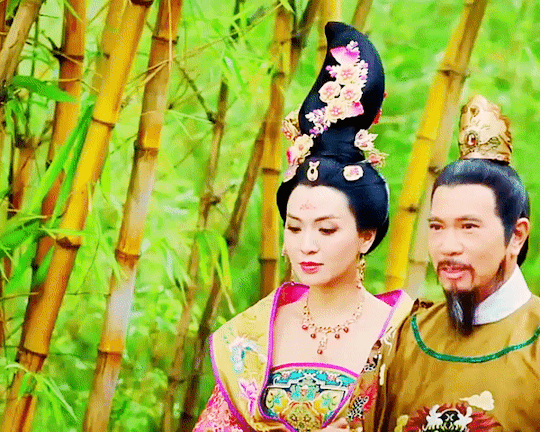

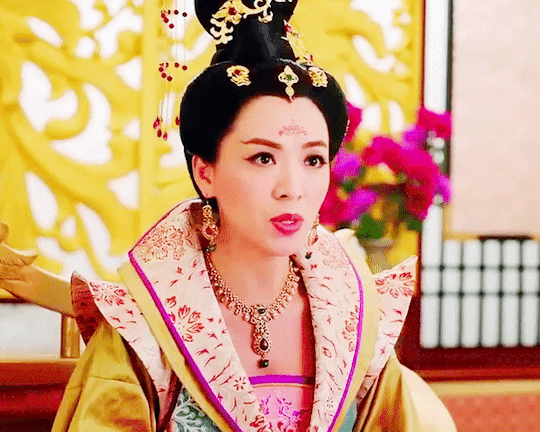
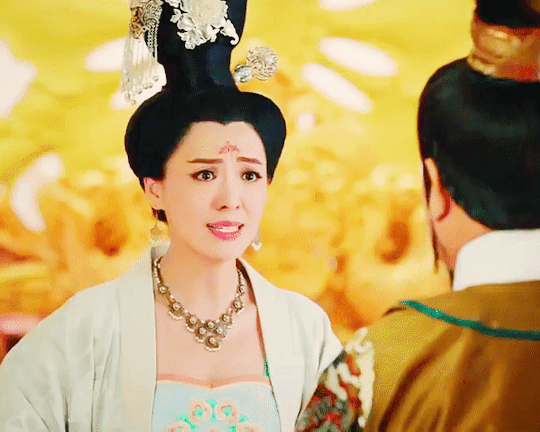
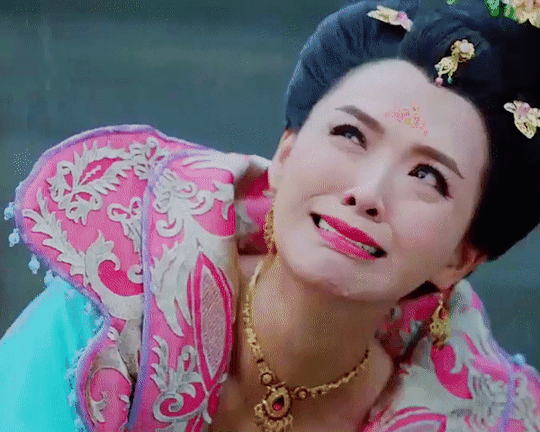
women in history (3/20): princess taiping of tang (662 – 2 august 713)
princess taiping rendered outstanding service and gained greater prestige. her power became ever more illustrious, and her territory became ever larger. her palace like the emperor’s palace was guarded by soldiers. her three sons were made princes and her relatives and friends were put in important positions. she could always talk directly with the emperor for hours at a time, and they were always adopted. individuals she recommended would be favored and promoted by the emperor; five of seven prime ministers in succession rose with her recommendation. many worthy officials who lost their posts were able to be restored with her support. she discussed and helped decide all military and state affairs.
- notable women of china. n.p., m.e. sharpe.
#women in history#princess taiping#dynasty: tang dynasty#cdrama#cdramanet#gifshistorical#weloveperioddrama#perioddramaedit#usersource#tvcentric#chewieblog#deep in the realm of conscience#alice chan#an absolute icon#i loved her in dtrc#she was such a magnetic character#and though she was the villain per se#they knew what they were doing with her#making her this badass stylish smart woman#the historical princess taiping was super amazing#and she could have done so much more#mine#wiheditsmeme
172 notes
·
View notes